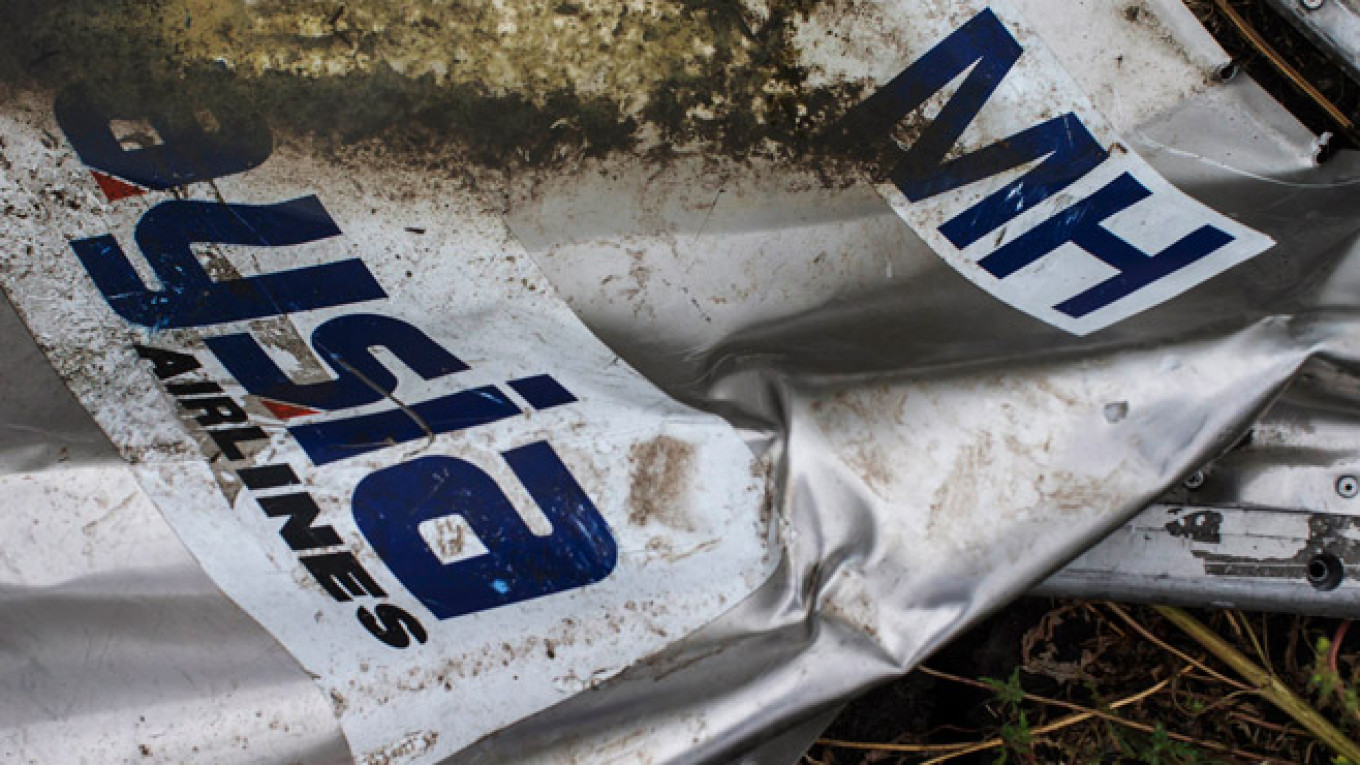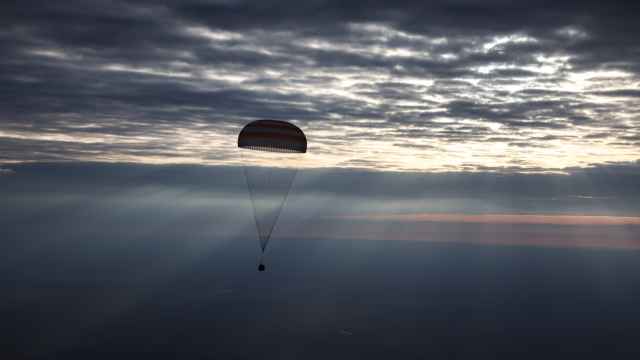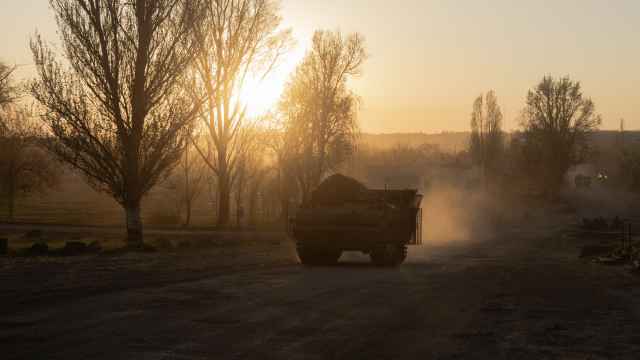A report due out Tuesday into the causes of the downing over eastern Ukraine last year of flight MH17, on which most of the passengers were Dutch nationals, is likely to put a further strain on the Netherlands' relations with Russia, analysts said.
The report by the Dutch Safety Board will be the first release in over a year of new official information on what caused the Malaysia Airlines passenger plane to crash in July last year, killing all 298 people on board — 196 of whom were Dutch nationals.
“MH17 was a traumatic development in our society. Almost everyone in the Netherlands knows someone [who died] or knows someone who is related to the [victims],” the Netherlands' Ambassador to Russia Ron van Dartel told the Moscow Times in an interview last week.
Since the Netherlands has a leading position in both the probe into the causes of the downing due out Tuesday and an ongoing criminal investigation by the Joint Investigation Team — which also includes Malaysia, Australia, Belgium and Ukraine — it has publicly refrained from pointing fingers at the risk of being perceived as biased.
“We have tried to be as neutral as possible,” van Dartel said.
But in the direct aftermath of the downing, there was a direct political fallout in the Netherlands' relations with Russia, already strained over the annexation of Crimea in March and Russia's role in the Ukraine crisis.
“For a long time, the Netherlands hid behind Germany in trying to delay economic sanctions against Russia [to protect trade interests]. But MH17 meant 'business as usual' was no longer possible,” said Tony van der Togt, a senior research fellow at the Clingendael Institute, a Dutch think tank.
The crash, which analysts and media swiftly said was likely caused by Russia-backed rebels shooting it down with a missile after mistaking it for a Ukrainian plane, pushed European Union countries to introduce a series of economic measures against Russia in late July last year.
Tuesday's report will not directly answer the question of criminal responsibility, but it will provide the evidence that could later be used to build up a legal case, analysts said.
“It will give an indication of what direction we should follow to look for the culprits,” said van der Togt.
Many predict that direction will be toward Moscow.
Competing Accusations
A preliminary report published by the Dutch Safety Board in September last year concluded the Malaysia Airlines plane was likely hit by a "large number of high-energy objects.”
Many took this as confirmation of the widespread theory that the plane had been hit by a Russian-made SA-11 Buk surface-to-air missile fired by pro-Russian separatists fighting government troops in eastern Ukraine.
The manufacturer of the missile, Almaz-Antey, is set to hold a press conference to coincide with the publication of the new report Tuesday. The company has promised to show the results of a “life-size, real-time" experiment to prove the missile was in Ukrainian possession and was fired from Ukrainian territory.
Russia in July vetoed the setting up of a UN tribunal to prosecute those responsible for the downing, an act van Dartel, the Dutch ambassador, called “disappointing.”
Van der Togt said the Russian moves were a sign Russia feared the outcome of the investigations.
“Russia has been placing question marks around everything, even before the publication of the report, to cast doubt upon it,” van der Togt said. “They are afraid they will end up on the defendant's bench,” he said.
That fear is not wholly unjustified. Dutch officials have a high political stake in prosecuting those involved and with the country set to take over the EU presidency in January, all eyes will be on The Hague.
In the direct aftermath of the MH17 downing, Dutch Prime Minister Mark Rutte said “measures would follow” once it became clear who was responsible for the tragedy.
“It is about who pushed the button but also who was above that. Because the pushing of the button most likely wasn't one isolated person,” the Dutch ambassador said.
Legal Dead-Ends
If the reports contain any evidence that those responsible for the downing were receiving Russian government support, Russia could be brought before the International Court of Justice, said Aaron Matta from The Hague Institute for Global Justice think tank.
But the ruling would not be binding unless Russia chose to accept the court's jurisdiction, Matta said, adding that that was “highly unlikely.”
Russia could also face potential cases from victims’ relatives at the European Court of Human Rights.
But to argue their case, applicants would have to exhaust all domestic legal remedies first and prove Russia breached Article 1 of the European Convention on Human Rights, the right to life. The court would have to determine that Russia had “effective control” of the region around the crash site and the separatists, Matta said.
Even if the European court did rule against Russia, there would be no guarantee Russia would comply with the ruling.
“Recent developments in Russian constitutional law may threaten compliance with any potential judgements against Russia,” Matta said.
A separate potential legal avenue would allow individual Russians or Ukrainians to be taken to the International Criminal Court in The Hague if they could be proved to have issued orders, taken orders, or participated in the actual downing of the plane and if domestic courts proved unwilling or unable to investigate the crimes and prosecute those responsible, he said.
Analysts said Russian cooperation in prosecuting its own nationals was an unlikely scenario.
And even if a special international tribunal were to be set up to try Russians accused of committing the crime, Russia's Constitution forbids the extradition of its nationals for prosecution abroad.
“It's highly unlikely Russia, in that case, would say “we'll put [the suspects] on the next Aeroflot flight your way,” said van der Togt.
Counting on Cooperation
Russia's reaction to both the technical report set to be published on Tuesday and the results of the criminal investigation later this year is crucial.
If it is seen as failing to cooperate with the investigation, the Netherlands could find itself politically bound to push Brussels to impose new punitive measures in the form of additional sanctions, analysts said.
Such sanctions could target Russia's gas sector, by including state-run gas giant Gazprom for example, or a ban on the import of Russian oil products, said van der Togt.
But such a ban would also be a blow for European countries, which are largely still dependent on Russian gas.
Analysts agreed Russia's veto in the UN Security Council suggested difficulties lay ahead. But Dutch politicians are still banking on Russia's cooperation.
“If you bring up the possibility of new sanctions with Dutch officials, they don’t want to even think about it,” van der Togt said.
Contact the author at e.hartog@imedia.ru
Correction: An earlier version of this story said 194 Dutch nationals died in the MH17 downing when, in fact, the number was 196.
A Message from The Moscow Times:
Dear readers,
We are facing unprecedented challenges. Russia's Prosecutor General's Office has designated The Moscow Times as an "undesirable" organization, criminalizing our work and putting our staff at risk of prosecution. This follows our earlier unjust labeling as a "foreign agent."
These actions are direct attempts to silence independent journalism in Russia. The authorities claim our work "discredits the decisions of the Russian leadership." We see things differently: we strive to provide accurate, unbiased reporting on Russia.
We, the journalists of The Moscow Times, refuse to be silenced. But to continue our work, we need your help.
Your support, no matter how small, makes a world of difference. If you can, please support us monthly starting from just $2. It's quick to set up, and every contribution makes a significant impact.
By supporting The Moscow Times, you're defending open, independent journalism in the face of repression. Thank you for standing with us.
Remind me later.






